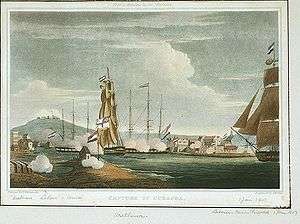HMS Halstarr (1807)
HMS Halstarr was the Dutch frigate Kenau Hasselar (or Kenau Hasselaar), launched in 1800 that the British captured at Curaçao in 1807. The Royal Navy took her into service but the Admiralty sold her for breaking up in 1809.
 The capture of Curaçao, depicted by Thomas Whitcombe | |
| History | |
|---|---|
| Name: | Kenau Hasselaar |
| Namesake: | Kenau Simonsdochter Hasselaer: a Dutch 16th Century heroine during the Siege of Haarlem |
| Builder: | P. Glavimans, Rotterdam |
| Launched: | 1800 |
| Captured: | 1 January 1807 |
| Name: | HMS Halstarr |
| Acquired: | 1 January 1807 by capture |
| Fate: | Broken up 1809 |
| General characteristics | |
| Type: | brig |
| Tons burthen: | 850 (bm; est.)[1] |
| Length: | 145' (Amsterdam feet)[Note 1] |
| Beam: | 40' |
| Depth of hold: | 15' |
| Propulsion: | Sails |
| Armament: | 32 guns |
Dutch career
Early in 1802, Kenau Hasselar, under the command of Captain Cornelius (or Cornelis) Hubertus Buschman, was assigned to the East Indies and Cape of Good Hope division of the Navy. After the end of the French Revolutionary Wars, the British ceded the Dutch colonies they had captured in the West Indies to the Batavian Republic. In August 1802, Buschman and Kenau Hasselar took a small squadron that also included the frigate Proserpina, the corvette Hippomenes, the cutter Rose, and the schooner Serpent, to take possession of Curaçao.[2][Note 2] Kenau Hasellar and Rose arrived at St Anna Bay on 22 December. The other vessels in the squadron sailed to other destinations.[Note 3] Shortly after Kenau Hasellar arrived at Curaçao, an outbreak of yellow fever swept through her that killed Buschman in February 1803, and many of her crew.[2]
On 24 April 1805, HMS Franchise was off Curaçao when she sighted a schooner that anchored under the guns of the fort of Port Maria. Franchise sailed in and fired on the fort and on the schooner for an hour before Franchise could cut the schooner out. The schooner turned out to be a tender to Kenau Hasselar. The schooner had a crew of a lieutenant and 35 men, but a number escaped ashore, leaving behind 24 of their wounded compatriots, as well as the surgeon and the lieutenant. Franchise had one man seriously wounded and two men slightly wounded.[3] The schooner was carrying lumber and rice.[4]
Capture, British service, & Fate
On 1 January 1807 Arethusa, Latona, Anson, Fisgard, and Morne Fortunee captured Curaçao, and with it Kenau Hasselar and the former British sloop Suriname.[5] The Dutch naval forces, under the command of Commandant Cornelius J. Evertz of Kenau Hasselar, resisted. Aboard Kenau Hasselar five men were killed, including Evertz, and one man was wounded. In 1847 the Admiralty authorized the issue of the Naval General Service Medal with clasp “Curacoa 1 Jany. 1807” to any surviving claimants from the action;[6] Sixty-five medals were issued.
The British commissioned Kenau Hasselar as Halstarr at Jamaica under Captain John Parrish. She was broken up in 1809.[1]
Note, citations, and references
Notes
- All linear measurements are in Amsterdam feet (voet) of 11 Amsterdam inches (duim) (see Dutch units of measurement). The Amsterdam foot is about 8% shorter than an English foot. The data is from the Rotterdams jaarboekje (1900), p. 110.
- For a map of Kenau Hasselar's recorded positions on the voyage see: Archived 25 February 2005 at the Wayback Machine Map of recorded positions.
- For instance, in the summer of 1803 Hippomenes was acting as a guard ship at Fort Stabroek, Georgetown, Demerara, where the British captured her and took her into service under her existing name. Serpent sailed to Berbice, where the British captured her in 1803 and took her into service as HMS Berbice. In 1804 the British captured Proserpine at Suriname and took her into service as HMS Amsterdam.
Citations
- Winfield (2008), p. 215.
- Hartog (1968), pp. 197-8.
- "No. 15823". The London Gazette. 9 July 1805. p. 902.
- "No. 15827". The London Gazette. 23 July 1805. p. 954.
- "No. 16003". The London Gazette. 22 February 1807. pp. 241–243.
- "No. 20939". The London Gazette. 26 January 1849. p. 241.
References
- Hartog, Johannes (1968). Curaçao, from colonial dependence to autonomy. Aruba: De Wit.
- Rotterdams jaarboekje (1900). Historisch Genootschap Roterodamum. (W. L. & J. Brusse).
- Winfield, Rif (2008). British Warships in the Age of Sail 1793–1817: Design, Construction, Careers and Fates. Seaforth. ISBN 978-1-86176-246-7.